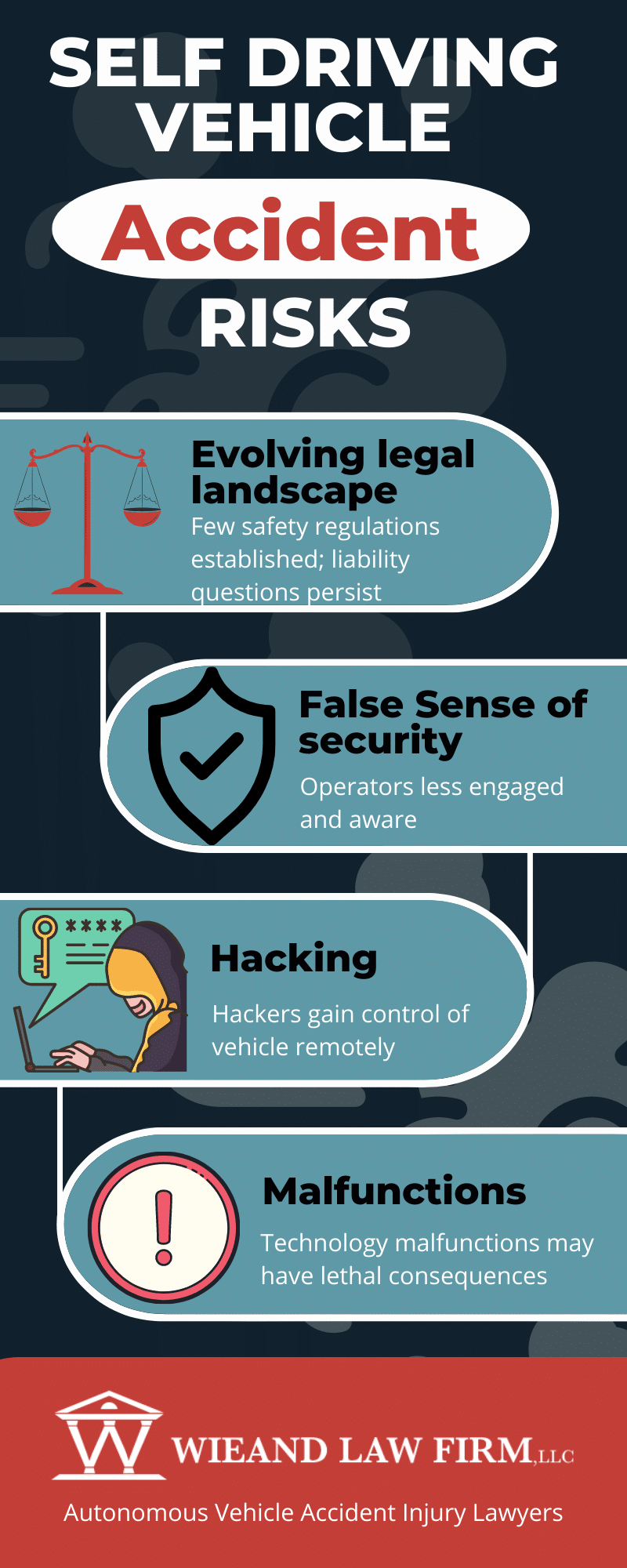 Manufacturers promise that autonomous vehicles (AV) will pave the way for a future of safer and easier transportation. However, autonomous vehicle accident lawyers recognize concerns with the potential for hackers to attack these vehicles. The increasing connectivity in autonomous vehicles may ultimately result in opportunities for hacking that lead to injuries, deaths, and property damage. This article will explore the potential hacking risks that can create autonomous vehicle accidents. Additionally, autonomous vehicle accident lawyers will explore the potential liabilities for damages that occur during an AV accident.
Manufacturers promise that autonomous vehicles (AV) will pave the way for a future of safer and easier transportation. However, autonomous vehicle accident lawyers recognize concerns with the potential for hackers to attack these vehicles. The increasing connectivity in autonomous vehicles may ultimately result in opportunities for hacking that lead to injuries, deaths, and property damage. This article will explore the potential hacking risks that can create autonomous vehicle accidents. Additionally, autonomous vehicle accident lawyers will explore the potential liabilities for damages that occur during an AV accident.
Enhanced connectivity in autonomous vehicles may yield multiple vulnerabilities for hackers to wreak havoc. Self-driving cars connect constantly to the internet to obtain information. According to autonomous vehicle accident lawyers, these vehicles use this technology to obtain GPS information, information on road conditions, and accidents. The artificial intelligence systems that continuously work to recognize traffic signs, estimate speed, detect objects around the vehicle, and plan the vehicles path make these cars vulnerable to hacking.
Autonomous vehicles use Light Detection and Ranging (LiDar) to obtain information about the driving environment and feed that information into a CNN computer model. The CNN computer model then uses that information to make decisions on speed and steering. Making pixel-level changes to the input images can allow hackers to gain access to the CNN.
The On-Board Diagnostics (OBD) are vulnerable to malware. Malware that is inserted into the Electronic Control Unit via the OBG may affect components such as the vehicle’s LiDar, radar, and camera and compromise passenger safety.
The Federal Bureau of Investigation (FBI) has stated that vehicle hacks have resulted in ransomware infections, data breaches, and unauthorized access to enterprise networks. In fact, the top 10 cars in 2020 contain internet connections to safety critical systems that leave them vulnerable to fleet-wide hacks. While in the past, hackers needed to be in the proximity of a vehicle to gain control. Now, 82% of vehicle hacks occur remotely.
Some of the vulnerabilities that researchers have investigated include:
While some of these hackers may be “lone wolfs,” there is also fear that terrorists could hack into a fleets vehicle to use autonomous vehicles as weapons. According to experts, a fleet-wide hack during rush hour could result in a large-scale catastrophe with thousands of deaths.
According to autonomous vehicle accident lawyers, few federal or state statues exist regarding autonomous vehicles. Plaintiffs looking to file a claim after an autonomous vehicle accident will need to consider the legal theories of negligence and strict liability. Manufactures of autonomous vehicles will be scrutinized based on the foreseeability of specific cyber attacks and held accountable for adopting technologies that are more difficult for hackers to control.
Multiple parties may be examined for liability for a hacked autonomous vehicle accident. These parties include:
Injured victims of AV accidents should consider reaching out to an autonomous vehicle accident lawyer to represent them in these complex cases. Plaintiffs will likely need to be able to prove that the cyber-attack had foreseeability based on a known vulnerability. In some cases, the court may undertake a cost-benefit/foreseeability analysis to determine the liability of damages from cyberattacks. Our personal injury attorneys understand what is needed to launch a successful claim when an autonomous vehicle accident results in a serious or catastrophic injury.
If you have been injured in a self-driving vehicle, reach out to the autonomous vehicle accident lawyers at the Wieand law Firm, LLC. Our team of professionals is familiar with the evolving landscape of autonomous vehicle litigation.
We offer a free consultation to speak directly with an attorney to learn more about the specifics of your case. From there, our attorneys work to investigate your claim and procure the resources you need to bring your case to fruition. We work with experts in the automotive and artificial intelligence (AI) industries to thoroughly examine, and when appropriate, support your claim. Call 215-666-777 or send a message via the online form to get started.